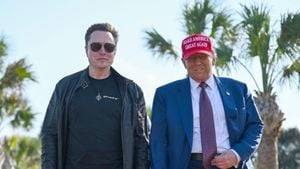Marco Rubio, the U.S. Secretary of State, is set to make history with his inaugural diplomatic trip abroad, visiting five Central American countries and the Dominican Republic. Scheduled to begin on February 1, this six-day visit is poised to realign U.S. foreign policy by focusing on strengthening ties with Latin America. The trip marks the first time since 1925 a Secretary of State has prioritized this region for their first official visit.
During his travels to Panama, El Salvador, Costa Rica, Guatemala, and the Dominican Republic, Secretary Rubio will address several pressing issues, most significantly immigration and the growing influence of China across Central America. According to State Department officials, this trip is positioned as the cornerstones of the Trump administration's strategy for the region.
Rubio underscored the importance of this diplomatic engagement, stating, "For many reasons, U.S. foreign policy has long focused on other regions, overlooking our own. That ends now". This sentiment echoes the administration's desire to forge closer partnerships and address challenges stemming from immigration and regional security.
Historical dynamics complicate Rubio's efforts, as many Central American nations are feeling the weight of U.S. immigration policies and cooperative agreements shaped by the Trump administration’s earlier dealings. With substantial fear over perceived U.S. abandonment under previous leadership, Latin American nations now seek stronger commitments from the U.S.
Starting with Panama, Rubio will face immediate discussions concerning the Panama Canal — now under Panamanian control but frequently cited by President Trump as being unduly influenced by China. While Panamanian President José Raúl Mulino rejected claims of any Chinese military presence or control, Rubio stated, "It is not in the national interest of the United States to have a canal we paid for and built used as leverage against us". These conversations are expected to focus on economic partnerships and shared commitments to controlling illegal migration through the Darién Gap.
Continuing his trek, El Salvador is next on Rubio’s itinerary. Under President Nayib Bukele’s administration, El Salvador has witnessed impressive societal reforms, particularly concerning public safety and organized crime. Rubio aims to strengthen bilateral cooperation on migration policies, including discussions about re-implementing the previously established 'Safe Third Country' agreement, which would allow the U.S. to send non-Salvadorans back to this northern nation.
While Costa Rica has maintained its status as a reliable U.S. partner, the recent increase of organized crime has raised alarms. Rubio will highlight this during his discussions with President Rodrigo Chaves, ensuring continued cooperation on security and economic stability. Both leaders are likely to examine ways to combat drug trafficking and reinforce U.S. trade relations, especially concerning advanced manufacturing.
When he reaches Guatemala, Rubio will engage with President Bernardo Arévalo on issues of immigration and economic development. Arévalo’s open invitation for cooperation positions Guatemala as willing to collaborate with the U.S. on deportations and economic integration. Given Guatemala's stance on recognizing Taiwan diplomatically, discussions will likely touch on deepening cultural and economic ties.
The Dominican Republic, under President Luis Abinader, has transformed itself by enforcing democratic principles amid regional instability, especially concerning neighboring Haiti. The Dominican Republic's enforcement of transparency and rule of law offers distinct opportunities for U.S. investment, with foreign direct investment soaring since 2019. Rubio's visit seeks to bolster commercial ties and address security issues stemming from transnational crime.
While each country presents distinct opportunities and challenges, the overarching theme of Rubio’s mission centers on creating stable and cooperative relationships as the U.S. seeks to re-establish its influence across the region. High-level dialogues during his trip will assess current diplomatic strategies and reaffirm commitments to countering both immigration-related crises and Chinese encroachment throughout Latin America.
Observations from various analysts indicate this trip symbolizes a significant pivot toward prioritizing Latin America within U.S. foreign policy discussions. Secretary Rubio's actions will reverberate far beyond his six-day itinerary.
With growing expectations from Latin American leaders for enhanced cooperation, the stakes are high during Rubio’s visit. By focusing on America's immediate neighbors, the administration aims to reinforce longstanding partnerships and influence regional dynamics positively, setting the stage for future collaboration.
While challenges undoubtedly remain, this unprecedented visit signals to both U.S. and Latin American partners alike the intention to forge stronger bonds within the region — clearly stating, "This is who we are," as the Secretary himself has remarked.



